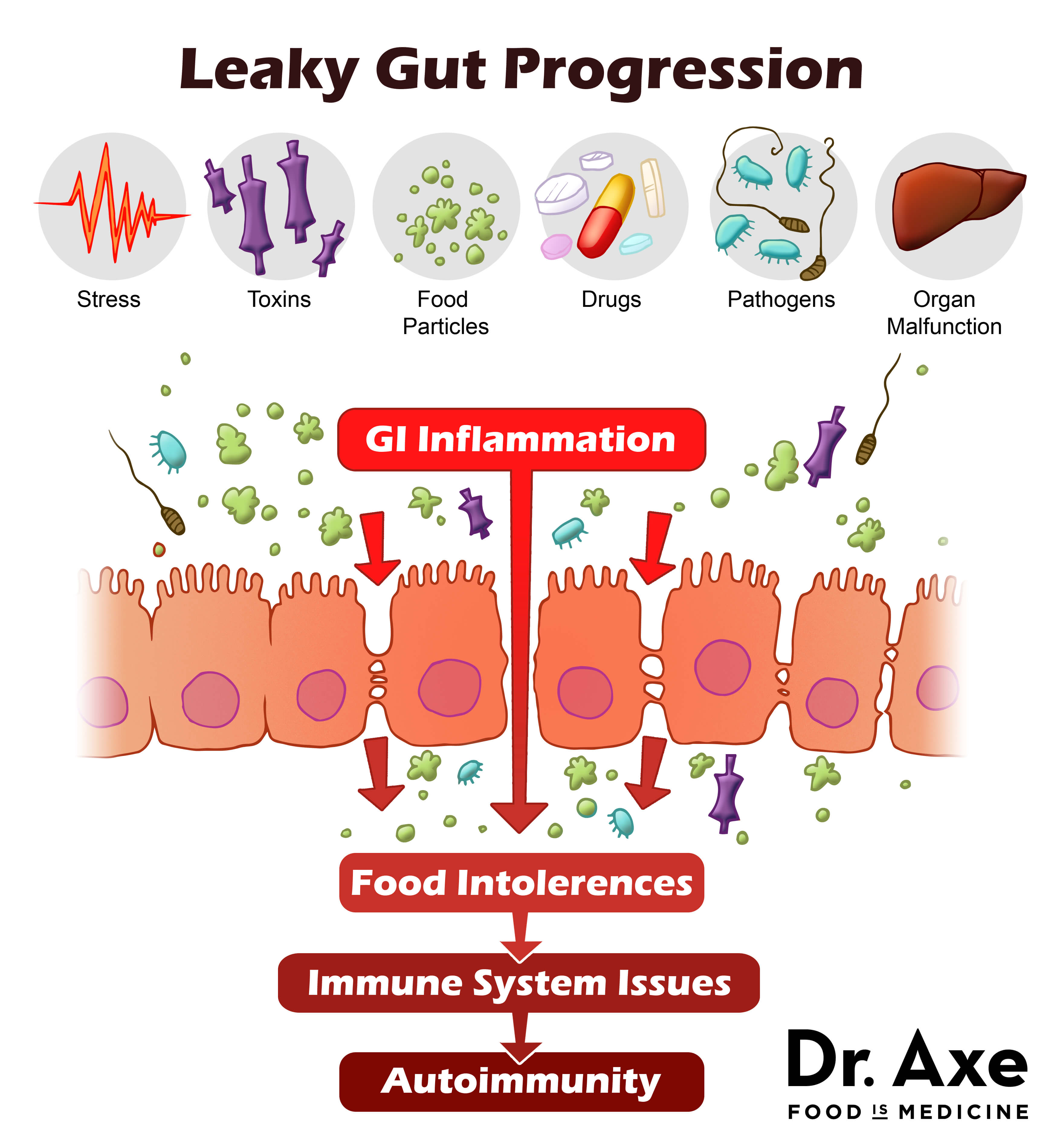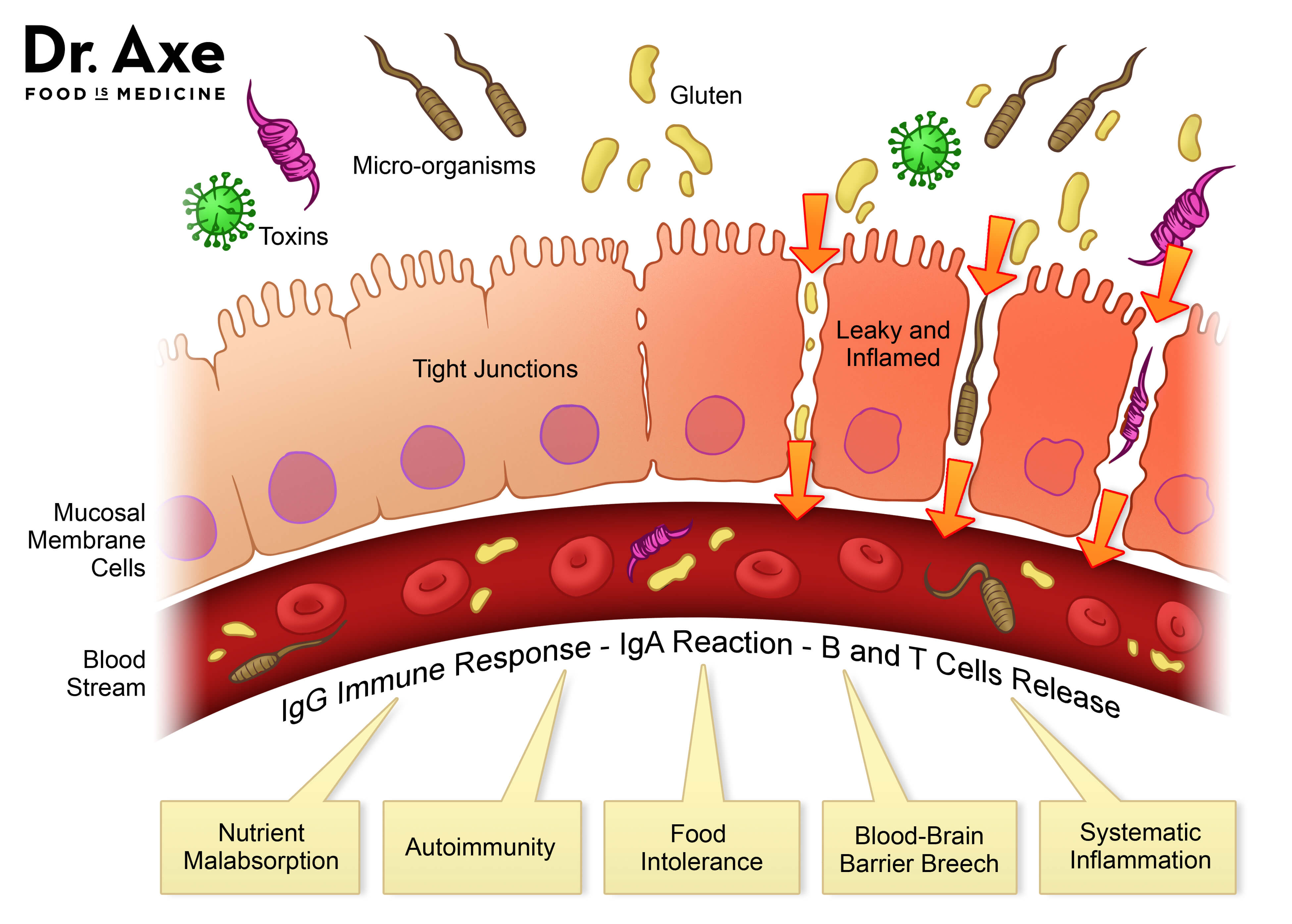The term “leaky gut” and perhaps even a mild definition of what it exactly means in terms of symptoms has I’m sure entered your awareness recently. I personally am still a bit confused on what exactly it is, what causes it, and how/why it needs to be fixed. In the nature of research and geeking out about weird body ailments I wanted to break-down these points to gain not only the knowledge for us, but also to see if this might be something you could be suffering from. Let’s jump in.
What is Leaky Gut?
First, let’s imagine our digestive tract as a long net with extremely tiny holes along it (akin to a cheesecloth) it only allows specific substances to pass through (perhaps more like airport security). Your gut lining works as a barrier to keep out bigger particles that can damage your system potentially.
When someone has leaky gut or increased intestinal permeability, the lining of the intestinal wall is damaged-i.e. that cheesecloth has a hole in it. This causes even larger holes in the wall to develop allowing for things that normally wouldn’t pass through to come through. Some of the substances that can pass through and can cause damage are gluten, proteins, bad bacteria, and undigested food particles. Toxic waste can also leak from the inside of your intestinal wall and than into your bloodstream causing an immune reaction. 

Why do people get Leaky Gut?
Four main causes of leaky gut include:
- Stress
- Poor Diet
- Toxin Overload
- Bacterial Imbalance
Food Causes
The most common foods that can damage our intestinal linings include; sugar, GMO’s (chemicals), conventional dairy, and proteins found in un-sprouted grains.
Why? Un-sprouted grains contain a large amount of anti-nutrients or nutrient blockers called phytates and lectins. Lectins are sugar-binding proteins that act as a natural defense system for plants that protect them from outside invaders like mold and parasites. Good news for plants but, detrimental to your body. Our digestive lining is covered with sugar-containing cells that help break down your food. Lectins gravitate toward this area and when they attach to your digestive lining, it damages your gut and causes inflammation.
Lectins are found in many foods, not just grains, but are found in larger concentrations in:
- Wheat
- Rice
- Spelt
- Soy
Sprouting and Fermenting grains reduces phytat and lectins therefore making them easier to digest. GMO and hybridized foods tend to be highest in lectins since they have been modified to fight off bugs.
Conventional Cows Milk can cause leaky gut.
- It contains a protein called A1 casein.
- Pasturization destroys vital enzymes, making sugars (lactose) difficult to digest.
- Consume dairy from A2 cows, goats, sheep or buffalo
Sugar can wreak havoc on your health, especially your digestive system.
- It feeds yeast, candida, and other harmful bacteria
- Harmful bacteria creates exotoxins that damage healthy cells and can eat holes in your intestinal wall
Stress
Chronic Stress in particular weakens the immune system over time. This cripples our ability to fight of invaders like bad bacteria and viruses-ultimately leading to inflammation. Some ideas to reduce stress:
- Get more sleep-it is crucial! This is when your body has a chance to heal and repair.
- Schedule in more fun and play
- Take one day off
- Surround yourself with positive, happy people
- Get outside
Toxins
We come into contact with toxins everyday and on average up to “80,000 chemicals and toxins every single year” according to Dr. Josh Axe an in nutrition and focused in leaky gut ailments. The worst offenders:
- Antibiotics
- Pesticides
- Tap Water
- Asprin
- NSAIDS
Buy higher quality water filter to eliminate chlorine and fluoride. Look for a more natural approach to reduce inflammation in the body in place of strong medications.
Dysbiosis or Chemical Imbalance
Imbalance between the beneficial and harmful species of bacteria in your gut. Contributions to this imbalance can be:
- This can begin as early as birth if you were born via C-section or because the mother didn’t have a healthy gut herself.
- Overuse of prescription antibiotic drugs
- Tap water-chlorine and fluoride
- Lack of probiotic-rich foods

What are the Symptoms?
This leads to inflammation in the system (the cause of most diseases) and causes an immune response. Symptoms can include:
- Bloating
- Food Sensitivities
- Thyroid Conditions
- Fatigue
- Headaches
- Joint Pain
- Skin issues like acne or rashes
- Weight Gain
- Digestive Issues
One of the biggest symptoms to watch out for is sudden food sensitivities. If you suddenly cannot tolerate a food you used to be fine with consider getting a test to see if leaky gut could be the cause. Remember that the partially undigested food that passes through those holes in the lining and enter the bloodstream and cause an allergic response. Not necessarily severe or obvious, but sometimes more subtle like the above list. If left unrepaired having an immune system that is consistently stressed can lead to more severe health issues like:
- Inflammatory Bowel Disease, IBS
- Arthritis
- Eczema, Psoriasis
- Depression, Anxiety
- Migraines, Muscle Pain
- Chronic Fatigue
According to the Journal of Diabetes, there is a strong body of evidence pointing to leaky gut as the major cause to autoimmune diseases-including Type 1 Diabetes.
Another issue with leaky gut is that it can (clearly) cause malabsorption of vital minerals and nutrients including zinc, iron, and vitamin B12. This surprised me and clued me into why many experts than recommend animal products for healing from these symptoms-animal protein is a rich source of this nutrients.

How can we fix it?
There is a solution! Most doctors, nutritionists, and experts recommend a four step process. It looks like the below:
- Remove foods and factors that damage the gut
- Replace with healing foods and herbs
- Repair with supplements
- Rebalance with probiotics
In an additional article, I’d like to explore which foods specifically, experts recommend and why, as well as a ore detailed dive into the “fix” for leaky gut.
Many articles seem to point towards animal sources for healing and as a primarily plant-based being I have some tough feelings towards this, but let’s dive in and see what power lies within those food sources and why they could truly help in healing.
Wishing you a happy week and smiles!